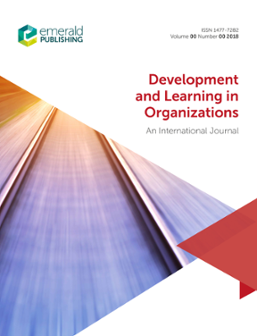Development and Learning in Organizations: Volume 36 Issue 2
Strapline:
An International JournalTable of contents
SME learning: leave it as a mess or solve it like a maze
Steven TamThis paper gives executives new perspective on how well employee learning is being managed in their small and medium-sized enterprises (SMEs).
Leading learning and innovation in organizations: a distributed leadership perspective
Ankita TandonThis paper explores the role of distributed leadership for learning and innovation in organizations. Learning and innovation being collective interactive processes, individual…
The taming of the scoundrel: how to tempt European Millennials to engage in international work-related mobility
Riina Koris, Iris KollingerThis research identifies the factors which motivate (or not) European Millennial students to accept work-related mobility. Insight into preferred length of mobility is also…
Does time perspective influence knowledge hiding? Empirical evidence from Indian employees
Namita Ruparel, Rajneesh Choubisa, Himanshu Seth, Gaurav NagpalThe current study aims to explore the relationship between time perspective and knowledge hiding at the workplace.
Effects of learning style and learning source preferences on organizational learning capability
Gregoris Demetriou, George Papageorgiou, Andreas EfstathiadesThe purpose of this research is the modeling of the relationship of Learning Style and Learning Source Preferences to Organizational Learning Capability (OLC).
Individual and organizational mindfulness: a social exchange-based approach
Soumendra N. Bagchi, Rajeev SharmaUnderstanding multiple dimensions of problem or opportunity and the context in an evolving environment is an essential task for leaders. The allied expectation is to be aware of…
Enhancing different elements of job engagement: Varying impact of organizational justice dimensions
Firms are able to significantly boost performance when employees are highly engaged in their work. A strong emphasis on the different forms of organizational justice can help…
Gender and workplace learning: How opportunities can differ
Firms must create optimum conditions in order for organizational learning to occur. To attain this goal it is imperative to address the social constructions of gender that can…
Gender diversity in the boardroom: Factors that shape how women directors affect performance
This paper aims to review the latest management developments across the globe and pinpoint practical implications from cutting-edge research and case studies.
How firms can achieve positive employee outcomes: Transformational leadership holds the key
Turnover intention remains an issue for many firms but can be effectively reduced if a transformational leadership style is adopted. Psychological empowerment of employees by such…
Increasing learning capacity in higher education institutions: Towards more effective crisis response strategies
Higher education institutions need to increase their capacity to learn in order to respond effectively to unanticipated major crises. Exploiting knowledge of past situations can…
Increasing the impact of management development programs: The critical role of reflection
Reflective practice makes an important contribution to the ultimate success of any management development program. Greater emphasis on reflection demands that both program…
Improvement opportunities for learning organizations: Context is a key factor
Scope for learning to occur at different levels can increase when firms develop a learning culture. Such organizations are able to identify valuable opportunities by exploiting…
Improving key competencies of project managers: The impact of core self-evaluations and cultural intelligence
This paper aims to review the latest management developments across the globe and pinpoint practical implications from cutting-edge research and case studies.
Informal learning and work engagement among older workers: The importance of organizational culture
Transfer of key skills and knowledge between older and younger workers remains vital for ongoing firm success. The effectiveness of this process can be increased when…
Intergenerational factors and satisfaction with work: The impact of different types of person-environment fit
Satisfaction with work among employees has important implications for organizational performance. Firms can achieve optimal results by identifying which types of…
Optimizing authentic leadership: Why the big five personality traits are significant
Personality is important in determining the effectiveness of authentic leadership. Organizations can optimize performance of such leaders by focusing on developing the most…
Reducing early retirement intention among older workers: Some key influential factors
Retirement of older workers results in a damaging loss of important knowledge and capabilities. By focusing on work goals, generating work passion and providing flexible work…
Successfully transitioning to a new workplace role: The impact of individual experience and self-belief
Making a transition to a new workplace role is often daunting for an employee. Firms can increase the likelihood of success through experiential forms of learning that can enable…

ISSN:
1477-7282Renamed from:
Training Strategies for TomorrowOnline date, start – end:
2003Copyright Holder:
Emerald Publishing LimitedOpen Access:
hybridEditor:
- Anne Gimson